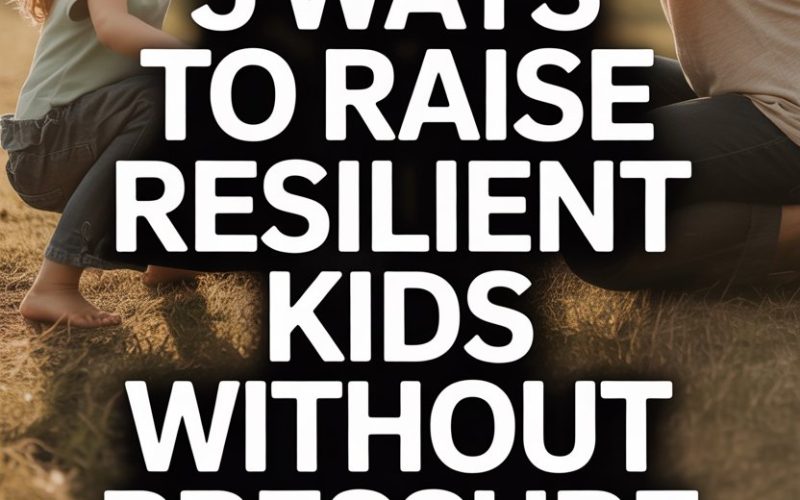Everyone wants their kids to bounce back from life’s little disasters—spilled juice, a forgotten lunch box, a playground squabble—with a grin and a “no worries, Mum!”
But who among us has the bandwidth to attend every school function, teach mindfulness before breakfast, and never, ever lose our temper? Not me, and I’m guessing not you, either.
The good news? Raising resilient children doesn’t require pressure, perfection, or a PhD in child psychology.
Here are five realistic, pressure-free ways to help your kids become the kind of people who can weather storms, laugh at spilled milk, and come back swinging.
1. Model Bouncing Back (Even When You Want to Hide in the Loo)
Resilience isn’t caught like a cold—if it were, every child who’s heard “just brush it off” would be a Zen master by Year Four.
Kids learn what resilience looks like by watching how the grown-ups around them handle setbacks.
Burnt the toast? Out of petrol? Accidentally sent your boss a text meant for your partner (not recommended)?
Instead of melting down or grumbling about your rotten luck within earshot, try narrating the disaster as a problem to solve: “Oh no, I burnt the toast! Guess we’re having cereal. Better luck tomorrow.”
According to child psychologists, this kind of out-loud problem-solving teaches kids that mistakes and mishaps are a normal part of life—and that grown-ups survive them, too.
Perfection isn’t the goal; showing your child that grown-ups sometimes fumble is oddly reassuring.
Pro tip: If you do lose it, apologise. “Sorry I snapped. Bad day. Let’s try again.”
That’s resilience in action, and it’s worth more than an Instagrammable moment.
2. Encourage Effort, Not Perfection
If you’ve ever seen a child dissolve into tears over a crooked drawing or a lost football match, you know how quickly the “I can’t do it!” mantra surfaces.
It’s tempting to rush in with praise or promises (“You’re the best! Next time you’ll win!”), but research shows that focusing on effort—not outcomes—builds real resilience.
Try phrases like, “I saw how hard you worked on that painting,” or, “You kept trying even when you were frustrated, that’s brave.”
According to a classic Stanford study on growth mindset, kids praised for effort are more likely to persist and less likely to collapse in the face of failure.
Bonus: The pressure’s off you to produce child prodigies. Forget perfect scores and Olympic medals. Your job? Cheer for the try, not the trophy.
3. Create Space for Real Feelings
Emotional resilience isn’t about being unflappable. It’s about feeling crummy sometimes and learning that those feelings won’t last forever.
Suppressing tough emotions—“Stop crying, it’s not a big deal!”—teaches kids to bottle things up, which is about as effective as taping a leaky pipe.
Instead, make home a safe space to feel all the feelings. When your child is upset, acknowledge it without problem-solving right away: “That sounds really hard. Want a cuddle or just some quiet?”
Research shared by APA suggests that when kids learn their feelings are safe (even the messy ones), they’re better equipped to roll with life’s knockbacks.
If your instinct is to fix everything, you’re in excellent company. Resist! (Or at least, resist for a few minutes.) Being heard is more powerful than being rescued. Bonus: It saves you a lot of unnecessary meddling.
4. Teach Age-Appropriate Problem Solving
Resilient kids aren’t born with magical powers—they’re just given room to figure things out (sometimes after spectacularly mucking it up).
When your child faces a challenge, whether it’s a missing shoe or a maths problem that looks like hieroglyphics, resist the temptation to swoop in.
Ask gentle questions: “What do you think we could try?” “Have you ever solved something like this before?”
Even if their solution is bonkers (“Let’s put Mum’s shoe on the dog and see if it fits!”), you’re building their confidence to tackle frustrations head-on.
According to advice from raisingchildren.net.au, kids who feel trusted to make decisions—big and small—grow up with stronger problem-solving muscles.
Does it make mornings slightly more chaotic? Sometimes. But when your five-year-old suggests using sticky tape to fix a broken toy, and it actually works, you’ll feel like you’ve won some secret parenting lottery.
5. Celebrate Small Steps and Silver Linings
The world isn’t short on big, shiny wins: spelling bee trophies, perfect spelling tests, being picked first for the footy team.
But resilience is forged in the tiny, everyday victories—the times your child tries again after falling off a bike, or sighs, “Well, that didn’t work!” and starts again.
Make it a habit to notice these moments. “I saw you kept going even when you got muddy,” or, “You were kind to your sister after she knocked over your blocks.”
Specific praise is far more encouraging than vague “good jobs,” and it helps kids recognise their own strengths.
Even if things go pear-shaped, find the silver lining. “You didn’t win, but you made a new friend,” or, “The biscuits were a disaster, but at least the kitchen smells amazing.”
According to positive psychology experts, reframing setbacks as learning opportunities helps children build grit—and a sense of humour about their own blunders.
No need for a parade every time someone ties their own shoelaces. But a wink and a “Nice save!” go a long way.
Real Resilience, No Perfection Required
Resilient kids aren’t bulletproof—or immune to tears, tantrums, or a good old-fashioned sulk. They’re kids who know that bad days pass, mistakes are fixable, and grown-ups are human, too.
Parenting without pressure doesn’t mean lowering your standards or letting your kids run wild with felt-tip pens and glitter glue (though, if you do, please send photos).
It means sending the quiet, powerful message: “You’re capable, you’re loved, and you’ll get through this—even if you need a snack and a nap first.”
That’s the kind of resilience that lasts a lifetime. And the best part? You don’t need to be a perfect parent to pass it on. Just the kind who tries, laughs at the chaos, and keeps showing up—burnt toast and all.




